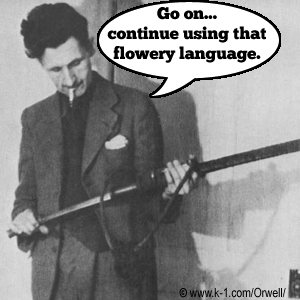I recently read ‘Why I Write‘ by George Orwell and within the essay ‘Politics and the English Language’ lie the ‘writing rules’ sometimes quoted on Twitter and elsewhere online.
It’s an interesting essay where he points out that jargon, unoriginal metaphors, padding and ‘humbug’ are used increasingly in politics and creeping into other literary arena’s.
Bear in mind that this was written in 1946 so he’s rapidly spinning in his grave at the moment.
The fact George frequently uses the word ‘humbug’ throughout this book is an unmitigated joy.
His rules are;
i. Never use a metaphor, similie or other figure of speech which you are used to seeing in print.
ii. Never use a long word where a short one will do.
iii. If it is possible to cut a word out, always cut it out.
iv. Never use the passive where you can use the active.
v. Never use a foreign phrase, a scientific word or a jargon word if you can think of an everyday English equivalent.
vi. Break any of these rules sooner than say anything outright barbarous.
All makes sense, except I wasn’t too sure about – iv. Never use the passive where you can use the active. – so a quick search brings up this ‘Active Voice Versus Passive Voice‘ which is a good explanation of ensuring the ‘subject’ of a sentence is put first.
So what’s the object of these rules?
Clarity. Orwell writes, before introducing these rules;
…it is better to put off using words as long as possible to get one’s meanings as clear as one can through pictures or sensations.
Use your thesaurus sparingly and your thoughts rigorously. There should always be space for art and craft in your writing but elaborating more on the style than the content can lose a reader…it loses me. I have an imagination, I can picture things in my mind, fill in the blanks, I don’t want a writer doing the thinking for me and leading me by the hand like a lost child.
The other beautiful point Orwell makes later on in this essay is;
…when you make a stupid remark its stupidity will be obvious, even to yourself.
I love this point!
I’ve sometimes tried to follow a train of thought in a first draft and got derailed by the ugly twists and awkward turns. If I can’t follow one of my own thoughts a few months later then how the hell is anyone else?! More often than not, the quick fix was to delete that particular messy sentence or concept. Other times, a little more careful thinking and tweaking would soon see it patched up into a functioning piece of prose.
Capacious and perspicacious words will not improve your ideas if they’re not good enough.
